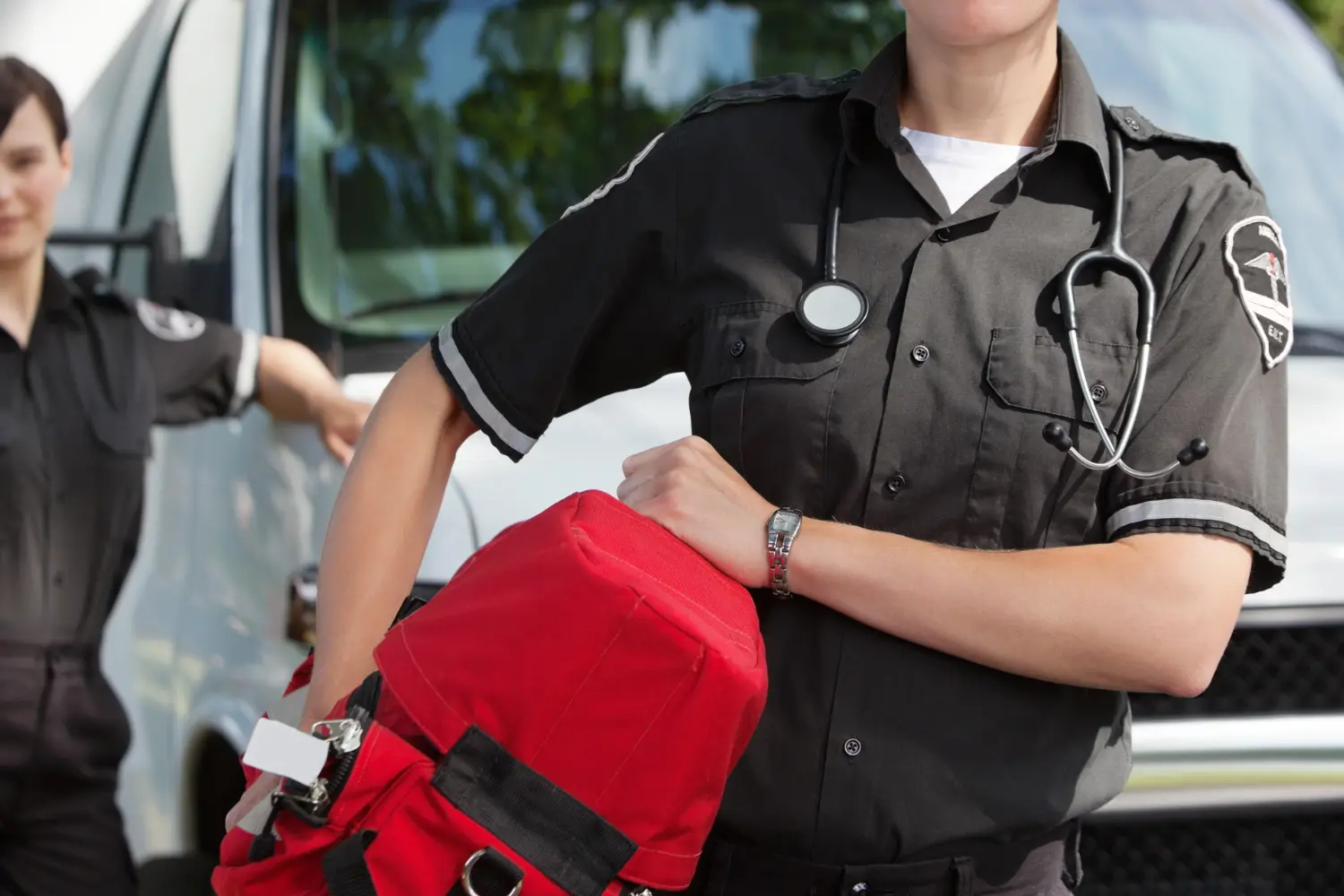
First Responders Addiction Treatment Program at Wellbridge
Unique, Customized Treatment Solutions For First Responders

Access Evidence-Based, Individualized Help at Wellbridge
First responders (such as law enforcement, firefighters, EMTs, and others) are the unsung heroes of society, facing untold challenges in the line of duty that often push them to their limits. Their roles demand quick thinking and decisive action in high-stress situations, exposing them to trauma and constant pressure.[1]
Unfortunately, these experiences can take a toll on their overall health—including behavioral health—leading to struggles such as addiction and co-occurring issues. Recognizing the unique needs of these courageous individuals, Wellbridge’s First Responders addiction treatment program offers a comprehensive approach to healthcare and recovery, addressing the intertwined issues of substance use disorder and mental health with personalized care and understanding.
Wellbridge ensures that those who dedicate themselves to protecting others have the resources and support they need to prioritize their own well-being.
How Is Being a First Responder Linked to Substance Use?
Being a first responder can be linked to substance use due to several factors:[2]
- Work-related stress: First responders often encounter high-stress situations, including accidents and emergencies. This chronic exposure to stress can lead some individuals to turn to substances as a coping mechanism.
- Trauma exposure: First responders frequently witness traumatic events, which can increase the risk of developing post-traumatic stress disorder (PTSD) or other mental health conditions. Substance use may be a way to self-medicate symptoms of trauma or PTSD.
- Peer influence: Within the first responder community, there may be a culture of using alcohol or other substances as a means of bonding or coping with the challenges of the job. This can create an environment where substance use is normalized or even encouraged.
- Shift work: Irregular and demanding work schedules, such as rotating shifts or long hours, can disrupt sleep patterns and lead to fatigue and stress. Some individuals may use substances to stay awake during night shifts or to relax after a particularly stressful shift.
- Lack of resources: Despite the critical nature of their work, first responders may face barriers to accessing mental health resources or may be reluctant to seek help due to stigma or concerns about confidentiality. This can lead to untreated mental health issues and an increased reliance on substances as a coping mechanism.
The Link Between PTSD and Substance Use Disorder
The link between PTSD and substance use is often bidirectional.[3] People grappling with PTSD may turn to substances like alcohol or drugs as a coping mechanism. In their efforts to manage these overwhelming experiences, first responders may find temporary (and problematic) solace in substance use.
However, substance use can exacerbate the symptoms of PTSD over time as well.[4] Rather than providing lasting relief, substances may intensify feelings of anxiety, depression, or emotional numbness, ultimately perpetuating a harmful cycle.
On the other hand, experiencing trauma and developing PTSD can also increase your vulnerability to developing a substance use disorder.[5] The psychological and emotional distress associated with PTSD may drive first responders to seek relief through substance use, even if they did not engage in such behavior prior to experiencing trauma. This vulnerability stems from the profound impact that trauma can have on your mental and emotional well-being, often leading to difficulties in regulating emotions and coping with stressors.
Addressing both PTSD and substance abuse concurrently (known as co-occurring disorders) is essential for effective treatment and recovery.[6] By treating the underlying trauma and providing coping strategies for managing substance cravings and triggers, a first responder addiction treatment program aims to break the cycle of PTSD and substance use disorder and help you regain control over your life and your work.[7]
What Are the Warning Signs of Addiction for First Responders?
Recognizing the warning signs of substance use and addiction among first responders is crucial for early intervention and support:[8]
- Changes in behavior: Noticeable shifts in behavior, such as increased secrecy, withdrawal from social activities, or avoiding responsibilities both at work and home, can be indicative of a potential substance use problem.
- Physical symptoms: Physical signs of addiction may include changes in appearance, such as bloodshot eyes, unexplained weight loss or gain, tremors, slurred speech, or impaired coordination.
- Emotional instability: Mood swings, irritability, agitation, or sudden outbursts of anger or hostility can be signs of underlying emotional distress, which may be exacerbated by substance use.
- A decline in work performance: Decreased productivity, frequent absences, tardiness, errors on the job, or an increase in accidents or near misses could indicate that substance use is interfering with job performance.
- Financial difficulties: First responders struggling with addiction may experience financial difficulties, such as unexplained expenses, borrowing money frequently, or selling personal items to fund their substance use.
- Relationship issues: Strained relationships with coworkers, friends, or family members, as well as isolation or withdrawal from social connections, may signal that substance use is impacting interpersonal dynamics.
- Risk-taking behavior: Engaging in risky behaviors, both on and off duty, such as driving under the influence, taking unnecessary risks during emergency responses, or engaging in unsafe sexual practices, can be red flags for addiction.
- Physical health problems: Chronic health issues, frequent illnesses, or unexplained injuries may result from frequent substance use or related risky behaviors.
- Changes in sleep: Disrupted sleep patterns, insomnia, or excessive tiredness could be indicative of substance use, particularly if it’s related to shift work or attempts to manage the effects of substance withdrawal.
- Legal issues: Involvement in legal problems, such as DUI charges, arrests for possession, or disciplinary actions at work, may suggest that substance use has reached a critical point.
Frequently Asked Questions About First Responders Addiction Treatment
Why do first responders need specialized addiction treatment?
First responders face unique stressors and traumas in their line of work, which can contribute to higher rates of addiction compared to the general population. Therefore, they often require specialized addiction treatment plans that address their specific needs and experiences.
What types of addiction commonly affect first responders?
First responders can be susceptible to various types of addiction, including but not limited to alcohol, prescription medications, illicit drugs, and behavioral addictions such as gambling or compulsive eating.
What makes first responders addiction treatment different from regular addiction treatment?
First responders substance use disorder treatment often incorporates elements tailored to the unique challenges and experiences of the profession. This may include trauma-informed care, specialized therapy addressing occupational stressors, and peer support groups consisting of fellow first responders, as well as aftercare options.
What are some common barriers preventing first responders from seeking help for addiction?
Barriers to seeking help for addiction among first responders may include fear of stigma or repercussions from employers, concerns about confidentiality, a perceived need to maintain a tough image, and difficulties in acknowledging vulnerability due to the nature of their work.
How do mental health issues often co-occur with addiction among first responders?
Many first responders experience mental health issues such as post-traumatic stress disorder (PTSD), anxiety, depression, and insomnia due to the cumulative stress and trauma of their work. These mental health conditions can often co-occur with addiction and exacerbate substance use disorders.
Can first responders continue working while undergoing addiction treatment?
Whether a first responder can continue working while undergoing addiction treatment depends on various factors, including the severity of their addiction, the level of support from their employer, and the nature of their duties. In some cases, accommodations may be made to allow the individual to receive treatment while still fulfilling their responsibilities, while in other cases, temporary leave or reassignment may be necessary for focused treatment and recovery.
Sources
[1] Centers for Disease Control and Prevention. (2018, March 19). Emergency Responders: Tips for taking care of yourself. Cdc.gov. https://emergency.cdc.gov/coping/responders.asp on May 10, 2024
[2] Gilman, S. (2020). Substance Use Disorders in First Responders the Vicious Cycle of Chronic Traumatic Stress Exposure and Sleep Deprivation as Contributing Factors. https://www.naadac.org/assets/2416/aa&r_winter2020_substance_use_disorders_in_first_responders.pdf on May 10, 2024
[3] Lewis-Schroeder, N. F., Kieran, K., Murphy, B. L., Wolff, J. D., Robinson, M. A., & Kaufman, M. L. (2018). Conceptualization, Assessment, and Treatment of Traumatic Stress in First Responders. Harvard Review of Psychiatry, 26(4), 216–227. https://doi.org/10.1097/hrp.0000000000000176 on May 11, 2024
[4] María-Ríos, C. E., & Morrow, J. D. (2020, January 13). Mechanisms of shared vulnerability to post-traumatic stress disorder and substance use disorders. Frontiers. https://www.frontiersin.org/articles/10.3389/fnbeh.2020.00006/full on May 11, 2024
[5] Abuse, N. I. on D. (2024, February 6). Trauma and Stress | National Institute on Drug Abuse (NIDA). Nida.nih.gov. https://nida.nih.gov/research-topics/trauma-and-stress on May 11, 2024
[6] Flanagan, J. C., Korte, K. J., Killeen, T. K., & Back, S. E. (2016). Concurrent Treatment of Substance Use and PTSD. Current Psychiatry Reports, 18(8). https://doi.org/10.1007/s11920-016-0709-y on May 11, 2024
[7] US Department of Veteran Affairs. (2014). Treatment of co-occurring PTSD and substance use disorder in VA – PTSD: National center for PTSD. Va.gov. https://www.ptsd.va.gov/professional/treat/cooccurring/tx_sud_va.asp on May 11, 2024
[8] Warning Signs. (n.d.). Office of Addiction Services and Supports. https://oasas.ny.gov/warning-signs on May 11, 2024
Caring For our First Responders at Wellbridge
Wellbridge understands the unique challenges faced by first responders battling substance use disorder and co-occurring conditions. Our comprehensive approach to first responder treatment ensures that you receive the personalized care you need to embark on the journey to recovery.
With a range of treatment options available, Wellbridge tailors our first responder drug rehab programs to suit the specific needs of each patient’s unique circumstances. If you or a loved one is struggling, know that there is help available.